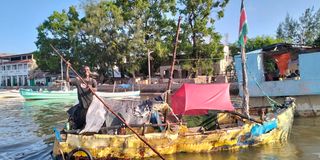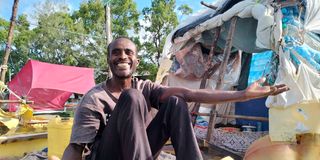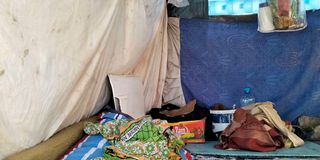A one-man war against plastic pollution in Indian Ocean

Mansoor Athman in his floating recycled plastics house and boat on June 2, 2025.
What you need to know:
- Since 2009, Mansoor has been transforming discarded jerrycans, bottles, and fishing nets into functional structures.
Lamu's pristine beaches and marine life face a growing threat from plastic pollution in the Indian Ocean, leading to concerns about tourism, fishing, and the overall health of the ecosystem.
But all is not lost.

Mansoor Athman during the interview.
In a bold move to combat the plastic crisis choking the island, a 47-year-old resident of Mkomani has built a floating home and boats entirely from recycled plastic waste collected from Indian Ocean.
Mansoor Athman spends most of his life in the ocean monitoring, collecting, and recycling plastic waste from beaches, demonstrating how waste can be repurposed into functional structures.
Mansoor, whose floating plastic house and boats are anchored near Lamu Island Forest Office, launched the campaign to collect and recycle plastic waste in 2009. He also educates locals on responsible waste disposal, recycling, and the dangers of ocean pollution.
For years, plastic pollution has plagued Lamu’s beaches, harming marine life, ecosystems, and local livelihoods—especially in fishing and tourism-dependent communities.
Mkokoni, Kiunga, Ishakani, Kiwayu, Kizingitini, Faza, Matondoni, Kipungani, Wiyoni, and surrounding areas remain choked with plastic waste; including water bottles, straws, old fishing nets, jerrycans, and abandoned boats.
This influenced Mansoor to embark on the initiative. “I collect the plastic waste and use it raw. This house has used over 1,000 jerricans.”
He says he has been spending most of his time in the floating plastic house as that gives him ample time to interact with sea users and spread the gospel of preserving a clean marine environment free of plastic pollution.

The floating house.
For Mansoor, a father of three and husband to Fatma Omar, the fight against plastic pollution began as a personal mission—one that initially strained his family life but has now earned their unwavering support.
His family, once unsure, now stands by him. “They’ve allowed me to spend almost every night here,” he says, gesturing to his floating workshop. “They know I’m up for a good cause.”
Mansoor adds that at first, his daily routine of scouring beaches with a sack for plastic waste made onlookers question his sanity. “People thought I was mad or homeless,” he admits. But today, his persistence has turned skepticism into admiration. His floating plastic home and boats, crafted from over 1,000 discarded jerrycans and hundreds of bottles, stand as proof of his vision.
“Today, many locals bring used plastics to my workshop for free. They know once they hand over such waste to me, it won’t end up in the sea because I normally recycle it.”
Mansoor’s connection to the ocean runs deep. His late father, Athman Khamis, was a chief ship engineer who sailed globally before passing away when Mansoor was just seven. “I believe my father’s blood drives me to do these wonders,” he reflects.
Formal education
Though poverty limited his formal education (he only reached Class Eight), his ingenuity is undeniable. “If given support, I could build plastic bridges, ferries, even lifesaving vessels,” he declares.
Mohamed Athman, director of Lamu Marine Forum, applauded Mansoor’s efforts in fighting plastic pollution. However, he highlighted a broader threat, noting that despite the government banning single-use plastics in August 2017, Indian Ocean faces a significant plastic pollution problem.
“I congratulate local efforts done by people like Mansoor. That means they’re aware of how plastics can negatively impact the marine ecosystem. Plastic pollution severely disrupts marine ecosystems by reducing biodiversity, harming sensitive habitats, and impacting the food chain. This occurs through various mechanisms like entanglement, ingestion, and the release of harmful chemicals,” said Mr Athman
Lamu Chief Officer for Environment and Climate Change Mohamed Dirie emphasised the need for locals and even tourists to reduce plastic pollution by recycling and avoiding disposing of waste in the ocean.
Mr Dirie said the county government is in the process of putting in place a waste management policy to ensure effective enforcement on matters of pollution.
He also urged locals to report pollution through hotline numbers provided on the county website for easy follow-up.
Apart from the latest modification of the floating plastic house and boats by Mansoor, Lamu has had various innovations in previous years intended to fight plastic accumulation in the Indian Ocean.
In 2018, the county made history after it launched the world’s first-ever Flip-Flopi, a dhow made entirely from recycled marine plastic.
The dhow was launched on World Cleanup Day -September 15, 2018 - with the aim of propelling the region and the world to a cleaner future free of plastic pollution.
It serves to reinforce the need for people to maintain cleanliness on beaches.
In 2022, a group of women from the remote island of Mkokoni in Lamu County hit the headlines when they turned plastics and glass waste into beautiful homes and recreational structures, helping preserve a clean and plastic-free environment.
In 2024, a group of residents in Pate Island, Lamu East came together and successfully constructed hotels, restaurants and resting structures, recreational platforms and rentals using plastic waste materials from the ocean.

